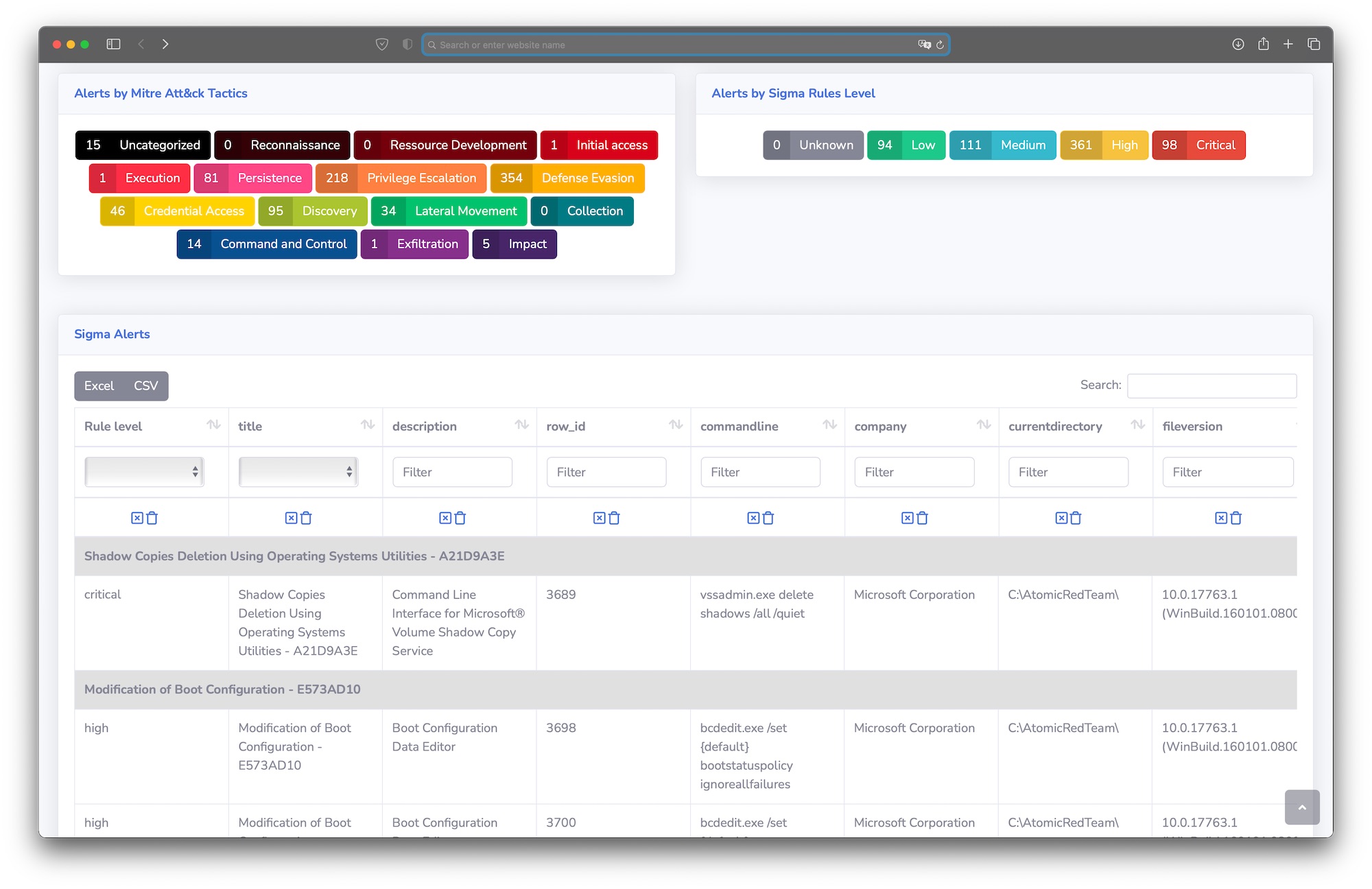Zircolite is a standalone tool written in Python 3 allowing to use SIGMA rules on Windows EVTX logs :
- It can be used directly on an endpoint (pseudo live-forensics) or in your forensic/detection workstation
- Zircolite was designed to be light (less than 500 lines of code), simple and portable
- Zircolite is more a workflow than a real detection engine (check here)
If you use zircolite.py with evtx files as input you can only execute it on a 64 bits OS (evtx_dump is 64 bits only).
Zircolite can be used directly in Python or you can use the binaries provided in release (Microsoft Windows only).
ℹ️ If you want to try the tool you can test with these EVTX files : EVTX-ATTACK-SAMPLES.
-
Evtx_dump : The tool is provided if you clone the repo. You can download also the tool directly on the official repository : here. In order to use it with Zircolite you must put it in the bin directory and name it accordingly to the following array :
Tool Windows MacOS Linux evtx_dump evtx_dump_win.exe evtx_dump_mac evtx_dump_lin
To enhance Zircolite experience, you can use the following third party Python libraries : tqdm, colorama, jinja2. You can install them with : pip3 install -r requirements.txt
Help is available with zircolite.py -h. If your evtx files have the extension ".evtx" :
python3 zircolite.py --evtx <EVTX folder> --ruleset <Converted Sigma rules>
python3 zircolite.py --evtx ../Logs --ruleset rules/rules_windows_sysmon.jsonZircolite provides a templating system based on Jinja 2. It allows you to change the output format to suits your needs (Splunk or ELK integration, Grep-able output...). To use the template system, use these arguments :
--template <template_filename>--templateOutput <output_filename>
python3 zircolite.py --evtx sample.evtx --ruleset rules/rules_windows_sysmon.json \
--template templates/exportCSV.tmpl --templateOutput test.csvIt is possible to use multiple templates if you provide as long as for each --template argument there is a --templateOutput argument associated.
The Mini-GUI can be used totaly offline, it allows the user to display and search results. It uses datatables and the SB Admin 2 theme. To use it you just need to generate a data.js file with the exportForZircoGui.tmpl template and move it to the gui directory :
python3 zircolite.py --evtx sample.evtx
--ruleset rules/rules_windows_sysmon.json \
--template templates/exportForZircoGui.tmpl --templateOutput data.js
mv data.js gui/Then you just have to open index.html in your favorite browser and click on a Mitre Att&ck category or an alert level.
If you have multiple endpoints to scan, it is usefull to send the detected events to a central point. As of v1.2, Zircolite can forward detected events to an HTTP server :
python3 zircolite.py --evtx sample.evtx --ruleset rules/rules_windows_sysmon.json \
--remote http://address:port/uriAn example server called is available in the tools directory.
Zircolite tries to be as fast as possible so a lot of data is stored in memory. So :
- As of v1.0, there is no "slower" mode that use less memory. Zircolite memory use oscillate between 2 or 3 times the size of the logs
- It is not a good idea to use it on very big EVTX files or a large number of EVTX
- Except when
evtx_dumpis used, Zircolite only use one core.
If you have a lot of EVTX files and their total size is big, it is recommanded that you use a script to launch multiple Zircolite instances. On Linux or macOS The easiest way is to use GNU Parallel :
find ../Samples/EVTX-ATTACK-SAMPLES/ -type f -name "*.evtx" \
| parallel -j -1 --progress python3 zircolite.py --evtx {} \
--ruleset rules/rules_windows_sysmon.json --outfile {/.}.jsonIf you don't have find and/or GNU Parallel, you can use the very basic Zircolite_mp.py available in the tools directory of this repository.
On an Intel Core-i9 8c/16t - 64 GB RAM (Need to be updated, Zircolite is even faster now):
| Monocore | Multicore | |
|---|---|---|
| EVTX : 34 GB - 16 folders | - | 12 Min |
| EVTX : 3,4 GB - 9 folders | - | 3 Min |
| EVTX : 1,2 GB - 6 folders | 11 Min | 1 Min 30 s |
| EVTX : 40 MB - 2 folders | 3 s | 1 s |
The SIGMA rules must be converted into JSON. This can be done with the genRules.py script located in the repository tools directory. Some rules are already provided in the rules directory.
Zircolite is more a workflow than a real detection engine. To put it simply, it leverages the ability of the sigma converter to output rules in SQLite format. Zircolite simply applies SQLite-converted rules to EVTX stored in an in-memory SQLite DB.
├── Makefile # Only make clean works
├── Readme.md # The file you are reading
├── bin # Directory containing all external binaries used by Zircolite
├── config # Directory containing the config files
├── pics # Pictures directory - not really relevant
├── rules # Sample rules you can use
├── templates # Jinja2 templates
├── tools # Directory containing all external tools
└── zircolite.py # Zircolite !
No installation needed. If you need to package it for standalone use on a computer use PyInstaller or Nuitka.
Zircolite is also packaged as a Docker image (cf. wagga40/zircolite on Docker Hub), which embeds all dependencies (e.g. evtx_dump) and provides a platform-independant way of using the tool.
Using Zircolite with Docker is as simple as:
docker container run --tty --volume /path/to/evtx:/case docker.io/wagga40/zircolite:1.1.4 \
--ruleset rules/rules_windows_sysmon.json \
--evtx /case --outfile /case/detected_events.jsonThis will recursively find EVTX files in the /case directory of the container (which is bound to the /path/to/evtx of the host filesystem) and write the detection events to the /case/detected_events.json (which finally corresponds to /path/to/evtx/detected_events.json).
Event if Zircolite does not alter the original EVTX files, sometimes you want to make sure that nothing will write to the original files. For these cases, you can use a read-only bind mount with the following command:
docker run --rm --tty -v /path/to/evtx:/case/input:ro -v /path/to/results:/case/output \
docker.io/wagga40/zircolite:1.1.4 -r rules/rules_windows_sysmon.json \
-e /case/input -o /case/output/detected_events.jsonSince the Docker image mirrors Zircolite's repository, all options are also available in the image.
- Install Python 3.8 on the same OS as the one you want to use Zircolite on
- After Python 3.8 install, you will need PyInstaller :
pip3 install pyinstaller - In the root folder of Zircolite type :
pyinstaller -c --onefile zircolite.py - The
distfolder will contain the packaged app
Zircolite has been used to perform cold-analysis (in Lab) on EVTX in multiple "real-life" situations. However, even if Zircolite has been used many times to perform analysis directly on an Microsoft Windows endpoint there is not yet a pipeline to thoroughly test every release.
- All the code of the project is licensed under the GNU Lesser General Public License
evtx_dumpis under the MIT license- The rules are released under the Detection Rule License (DRL) 1.0







